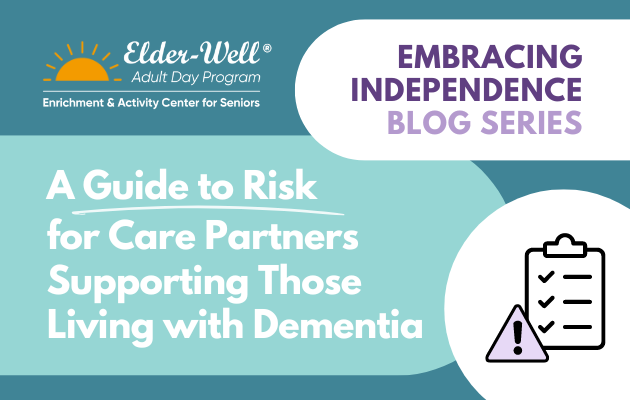Call us today at:
866-821-4333Call us today at:
866-821-4333Oct 01,2024

As care partners, we want to protect our loved ones living with dementia from harm. It’s only natural to feel a sense of responsibility to ensure their safety, particularly as they face challenges in memory, decision-making, and daily tasks. However, in our efforts to shield them from risks, we can sometimes unintentionally overprotect, which may lead to a loss of independence, self-esteem, and personal fulfillment.
This is where the concept of the “dignity of risk” becomes crucial. Embracing the dignity of risk is about finding a balance between safeguarding your loved one and allowing them the autonomy to live as independently as possible, even if that involves some level of risk. Supporting their right to take risks—even minor ones—can help preserve their sense of identity and dignity, enhancing their overall quality of life.
What is the Dignity of Risk?
The dignity of risk refers to an individual’s right to make their own decisions and take risks, even if those choices carry the potential for harm or failure. This concept is central to person-centered care, which emphasizes the importance of respecting each person’s autonomy and individuality.
For someone living with dementia, the dignity of risk means allowing them to continue making choices about their life—whether it’s deciding what to eat, where to walk, or how to spend their day. Even though dementia may affect their ability to assess risks fully, they still have the right to experience life on their own terms, with appropriate support from their care partners.
The Importance of Finding Balance
Embracing the dignity of risk does not mean neglecting safety—it means finding a thoughtful balance between protection and independence. For care partners, this can be a challenging balance to strike, but it is essential for the emotional and psychological well-being of the person with dementia.
1. Assess Risks Thoughtfully
Not all risks are the same, and part of supporting the dignity of risk is learning to differentiate between acceptable risks and those that may be more dangerous. For example, allowing your loved one to choose their clothes for the day might result in an outfit that doesn’t match—but it’s a harmless risk. On the other hand, deciding to walk outside alone in an unfamiliar neighborhood could pose significant safety concerns.
By assessing each situation, you can make informed decisions about when to step in and when to allow some level of risk. Focus on risks that are manageable and less likely to cause serious harm while providing necessary support when the risks are greater.
2. Encourage Decision-Making
One of the core principles of the dignity of risk is empowering individuals to make their own choices. Even if your loved one has cognitive impairments, they can still express preferences and make decisions. Encouraging these decisions—no matter how small—helps them retain a sense of control over their life.
For example, you might let them decide what to have for lunch, which activity to participate in, or which route to take on a walk. These decisions not only boost their confidence but also reaffirm their identity and personal preferences.
3. Provide Support, Not Control
Supporting someone’s right to take risks doesn’t mean leaving them to navigate challenges entirely on their own. Instead, it’s about providing a safety net when needed, while still allowing them to engage in meaningful activities and decisions.
For instance, if your loved one enjoys cooking but is no longer safe to use the stove unsupervised, you could offer to assist with chopping vegetables or setting up the ingredients. This way, they still feel involved and valued, while you ensure their safety.
4. Respect Their Right to Fail
Everyone makes mistakes, and individuals living with dementia are no different. It’s important to recognize that failure is a natural part of life and learning, and protecting someone from every possible mistake can lead to a loss of self-esteem and purpose. When care partners overprotect, they may inadvertently send the message that their loved one is no longer capable of contributing meaningfully to their own life.
Allowing minor mistakes—like forgetting an ingredient in a recipe or misplacing an item—can help maintain their sense of agency. More importantly, it reinforces the idea that they are still an active participant in their own life, despite the challenges posed by dementia.
Embracing the dignity of risk offers significant emotional and psychological benefits for those living with dementia. Here are some of the key benefits:
While it may seem like protecting your loved one from risk is the best way to keep them safe, overprotecting can have unintended consequences. When individuals are shielded from every possible risk, they can lose their sense of self-worth, purpose, and independence.
Over time, overprotection can lead to increased dependence on others, decreased motivation to engage in daily activities, and a sense of being disconnected from life. This can create a cycle where the individual feels less capable, leading care partners to take on even more control, further reducing their autonomy.
Final Thoughts: A Balanced Approach to Care
As a care partner, it’s important to remember that supporting the dignity of risk is about striking the right balance between safety and independence. By thoughtfully managing risks, encouraging decision-making, and allowing your loved one to continue participating in life’s activities, you help preserve their dignity, self-esteem, and emotional well-being.
The dignity of risk acknowledges that while dementia may bring challenges, it should not diminish an individual’s right to live a fulfilling, meaningful life. By embracing this concept, you provide not only care but also respect for the autonomy and humanity of your loved one, helping them live well with dementia.
Disclaimer: Nothing on this website is intended, and shall not be deemed to constitute, an offer to sell a franchise. Franchise offerings are made only by a Franchise Disclosure Document and only in those states where permitted. The Elder-Well Franchise Disclosure Document has not been filed with any franchise registration state.